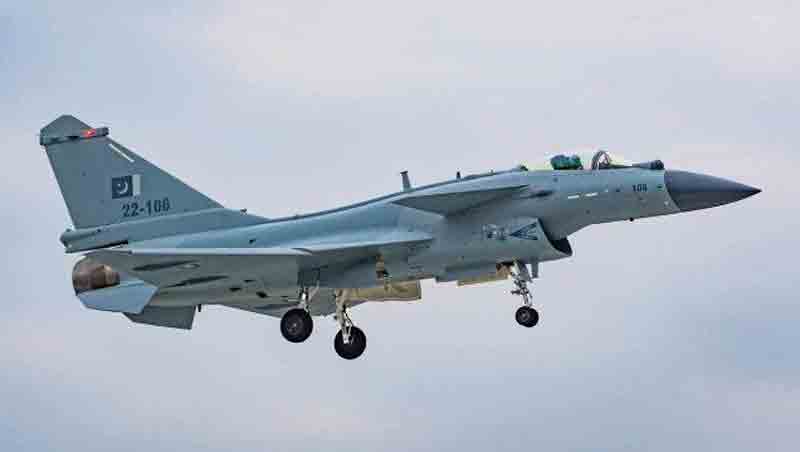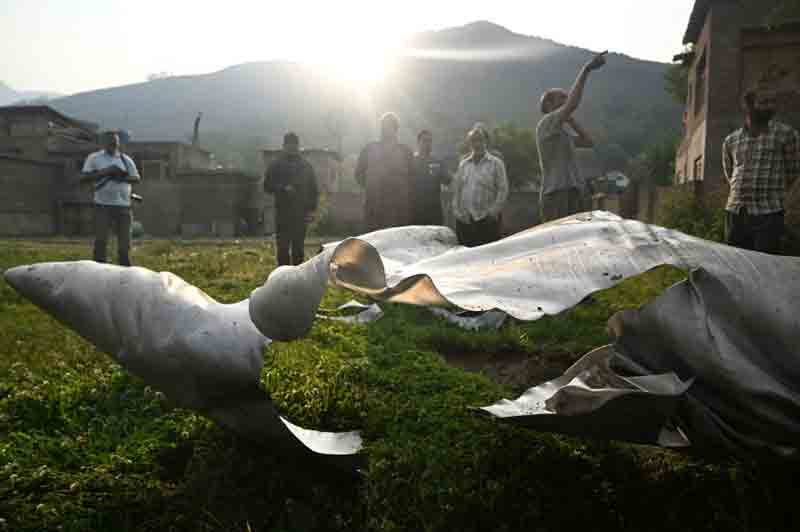The ongoing violent conflict between India and Pakistan represents a significant international crisis that would have previously triggered a robust diplomatic initiative from the United States to de-escalate tensions and prevent a larger war.
However, this recent escalation over Kashmir may serve as a litmus test for the Trump administration’s capacity and limited ambitions for global engagement, as well as for a world that lacks American leadership.
On Tuesday, President Donald Trump provided a tepid initial reaction to the conflict, stating, ‘It’s a shame. I just hope it ends quickly.’ By Wednesday, he slightly expanded his comments, expressing a willingness to mediate without demonstrating much eagerness to intervene. ‘I get along with both, I know both very well, and I want to see them work it out,’ Trump remarked.
‘They’ve gone tit-for-tat. So hopefully they can stop now. … If I can do anything to help, I will be there.’
Secretary of State Marco Rubio has been in contact with senior officials from both India and Pakistan in recent weeks, particularly following India’s military actions deep within Pakistani territory on Tuesday, as noted by the State Department. However, there is currently no sign of a comprehensive US initiative to facilitate international mediation or manage the crisis.
This may be due in part to the prevailing belief that the timing for diplomatic efforts is not yet appropriate, as both nations are expected to escalate their actions further. While Pakistan have downed five Indian aircraft, its leaders have vowed to retaliate against Indian military targets.
The US response will be closely monitored in the upcoming days, as the second Trump administration has discarded the traditional US foreign policy framework, creating a void where American multinational leadership once thrived.
Trump shows minimal interest in fostering international coalitions or activating US alliances to achieve shared objectives. Instead, he prefers to leverage US economic and military strength to influence smaller nations for America’s benefit, perceiving little distinction between allies and adversaries in his limited win-loss perspective.
It would be quite paradoxical for a president with expansionist ambitions towards Greenland, Canada, and Panama to mediate one of the world’s most complex territorial conflicts. Although Trump has positioned peacemaking as a key focus of his new term, his attempts to alleviate global tensions amid ongoing conflicts in Ukraine and Gaza have yielded minimal results.
His diplomatic initiatives in Ukraine and regarding Israel’s conflict in Gaza, led by his inexperienced envoy Steve Witkoff, have also included transactional efforts aimed at securing financial or other benefits for the US. He pressured the Kyiv government into an agreement for the exploitation of rare earth metal resources.
Furthermore, the president proposed relocating Palestinians from Gaza — an act that could be seen as neocolonial ethnic cleansing — to facilitate the creation of ‘the Riviera of the Middle East.’ There appear to be no clear financial or other incentives for the US in Kashmir that would capture Trump’s interest.
Historical US peace initiatives — such as President Jimmy Carter’s role in the Israel-Egypt peace accords and President Bill Clinton’s resolution of the Yugoslav wars — required extensive periods of trust-building and meticulous diplomatic groundwork at lower levels. In the past three months, there has been no indication that Trump is inclined to pursue a similarly comprehensive strategy in any ongoing conflicts, let alone a new one in South Asia.
Kashmir is a region located in the northwest part of the Indian subcontinent, bordered by Afghanistan, China, India, and Pakistan. Both India and Pakistan assert claims over the entire territory, with each nation controlling a portion divided by a tense boundary known as the Line of Control. Additionally, China governs a segment of Kashmir.
The roots of the prolonged conflict trace back to the late 1940s when Britain, the departing colonial power, partitioned India into two distinct nations. Since that time, India and Pakistan have engaged in three wars over Kashmir, along with numerous smaller clashes and outbreaks of violence in the past 25 years.
A significant moment occurred in 1999 when President Clinton intervened during the Kargil conflict, driven by concerns from the US intelligence community that the situation could escalate into a catastrophic nuclear war between two nations that had both recently conducted nuclear tests.
In more recent years, both Pakistan and India have moderated their nuclear posturing, even during periods of heightened tension regarding Kashmir. As both countries have matured as nuclear powers, the fears of a catastrophic war involving weapons of mass destruction have diminished.
Nevertheless, the United States has determined that it is crucial to prevent the Kashmir conflict from escalating further, as evidenced by the actions taken during the first Trump administration when then-Secretary of State Mike Pompeo intervened to ease tensions between the two South Asian nations over Kashmir six years ago. In his memoir, Pompeo reflected, ‘I do not think the world properly knows just how close the India-Pakistan rivalry came to spilling over into a nuclear conflagration in February 2019.’
The global community is anxiously anticipating the next potential escalation regarding Kashmir. India has defended its missile strikes on Pakistan-administered Kashmir and Pakistan itself by claiming it targeted terrorist camps. In response, Pakistan has pledged retaliation, citing the deaths of 31 civilians due to India’s actions. Prime Minister Shehbaz Sharif of Pakistan cautioned in a national address that ‘they may have thought we would back down, but they overlooked that this is a nation of courageous individuals.’
The likelihood of further escalation from India increases if it perceives a need to react to new attacks from Pakistan. Political motivations for such a response are heightened, particularly following the terror attack and the loss of Indian aircraft, which are seen as personal setbacks for Modi. CNN has verified the downing of one Indian jet, which was French-made.
Additionally, the reluctance of the Trump administration to assume a conventional US global leadership role, along with other factors, suggests that previous diplomatic approaches may be less effective in today’s more fragmented and unstable world order.
The Kargil crisis of 1999 notably brought the United States closer to India, a nation that has become increasingly powerful, assertive, and affluent. Each subsequent administration has continued this trend initiated by Clinton. Trump, sharing a personal and political bond with Modi, a fellow nationalist, has further solidified this relationship.
Meanwhile, the US’s ability to exert pressure on Pakistan has diminished since the dissolution of their uneasy alliance in the war on terror and the US withdrawal from Afghanistan. Consequently, Pakistan has fully returned to its longstanding political alignment with China, resulting in both South Asian rivals having superpower allies.
Milan Vaishnav, director of the South Asia program at the Carnegie Endowment for International Peace, stated during an interview on Wednesday that the United States has undergone a significant shift in its foreign policy stance in recent years. He emphasized that India has emerged as a crucial strategic ally for the U.S., while Pakistan’s relevance has notably diminished. Vaishnav suggested that the U.S. anticipates a response from Pakistan, hoping that both nations can navigate the situation in a way that allows them to maintain dignity and find a resolution.
In the absence of U.S. involvement, mediation efforts in the Middle East may commence, with Qatar playing a pivotal role in facilitating ceasefires and hostage negotiations between Israel and Hamas. The Qatari government has expressed its condolences and condemned the recent attack in Indian Kashmir. Indian media, which can often escalate tensions, reported on a call between Qatar’s Emir Sheikh Tamim al-Thani and Prime Minister Modi, interpreting it as a deliberate slight towards Islamabad.
Additionally, Qatari Prime Minister Mohammed bin Abdulrahman Al-Thani engaged in separate discussions with India’s external affairs minister and Pakistani Prime Minister Sharif. The Qatari foreign ministry affirmed its commitment to supporting all regional and international initiatives aimed at resolving the disputes between India and Pakistan.
Some analysts pointed out that Pakistan’s creditors, including the United Arab Emirates and Saudi Arabia, possess the influence necessary to encourage restraint from Islamabad, particularly as Pakistan grapples with a severe economic crisis.
However, unless the situation deteriorates significantly, it is unlikely that the United States will take the lead in international efforts to address the crisis.
Discover more from Defence Talks | Defense News Hub, Military Updates, Security Insights
Subscribe to get the latest posts sent to your email.





